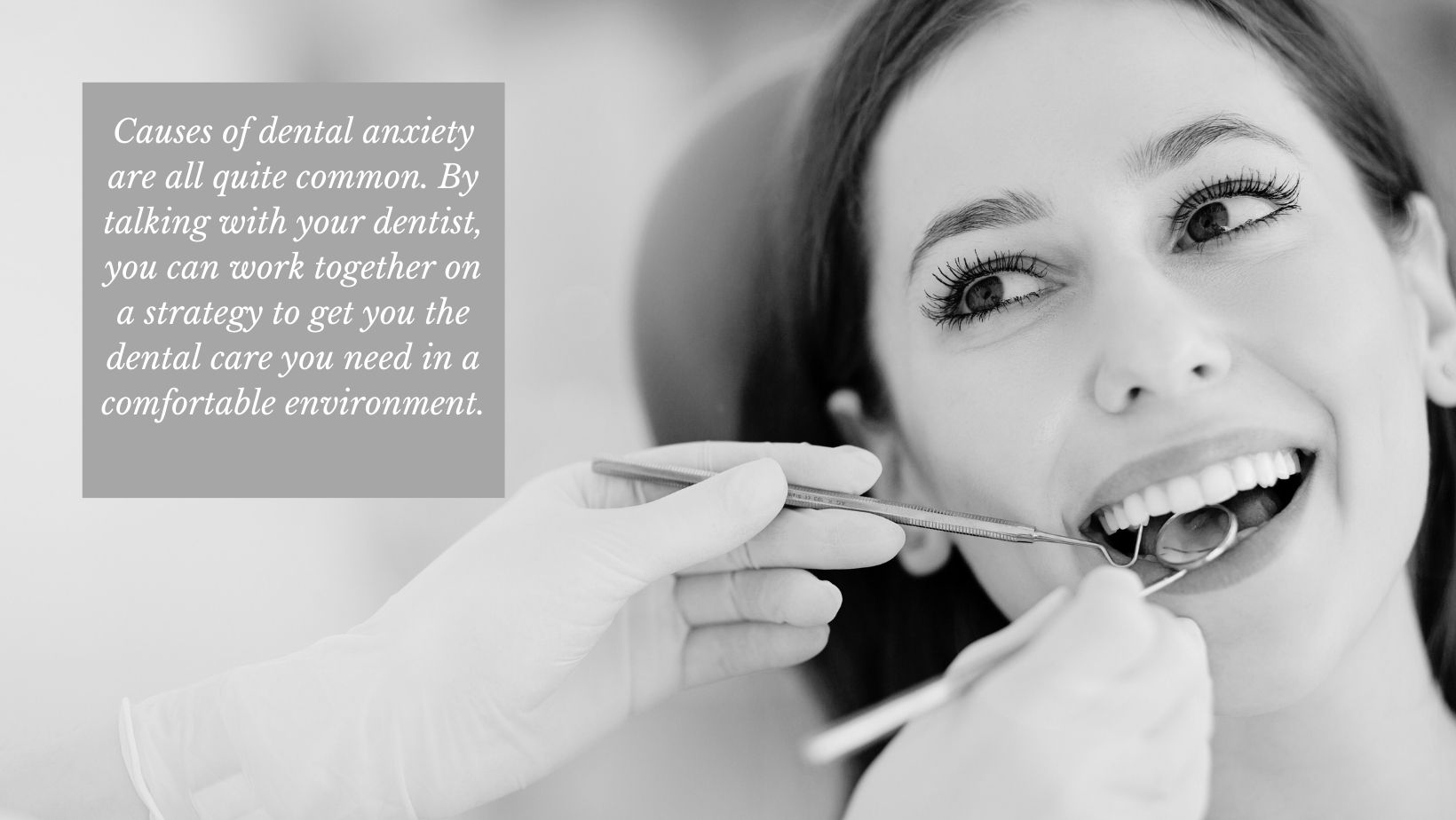How to Overcome Dental Anxiety
If you have anxiety about visiting the dentist, it’s important to know that you are not alone. Whether it’s the thought of needles and drills or just pain in general, many adults experience fear and stress when it’s time for dental work. In fact, dental anxiety is the fifth most common type of anxiety overall!
The good news is that dentists understand dental anxiety in their patients and are armed with time-tested strategies for reducing it to make dental care comfortable and stress-free. And, there are several things you can try on your own to reduce anxiety prior to a dental appointment. Depending on the severity of the anxiety, strategies range from relaxation techniques and listening to music to medications that help you relax during a cleaning or dental procedure.
How Common is Dental Anxiety? Probably More Than You Thought!
Dental anxiety is more common than you might think. It is estimated that more than 30% of Americans avoid dental appointments due to fear and anxiety. This fear can stem from various factors, and its intensity varies from person to person. Some anxiety shows up as mild nervousness, while some people face a paralyzing fear that prevents them from seeking dental care altogether.
Some of the common reasons for dental anxiety are listed below. Before you read through them, it can be helpful to remember that dental technology has come a long way. Today’s treatments are less invasive and are virtually pain free. In addition, your dentist has strategies for helping you manage anxiety around choking, needles, and other common fears.
- Past experiences: A significant number of people with dental anxiety have had negative experiences in the past, such as painful dental procedures or problems managing fears during an appointment. These memories can create lasting emotional trauma.
- Fear of pain: The fear of pain is a common cause of dental anxiety. This fear can be rooted in previous painful dental experiences or fueled by stories from friends and family.
- Fear of choking: People may fear gagging or choking during a dental cleaning or restorative procedure like a filling. They may fear not being able to breathe or swallow.
- Needle phobia: Fear of needles is a common anxiety, and dental procedures often involve injections for local anesthesia. The fear of needles often prevents people from seeking dental care.
- Sounds and smells: The noise of the dentist’s tools and instruments, as well as the odors that arise during some treatments, can make some patients uneasy.
- Embarrassment and self-consciousness: Dental procedures often involve close proximity and potential discomfort, leading some people to feel self-conscious or embarrassed about their oral health. This self-consciousness can contribute to anxiety. Be assured that the dentist’s job is to provide oral care, not judgment. They only want what’s best for you and your dental health.
These causes of dental anxiety are all quite common. By talking with your dentist, you can work together on a strategy to get you the dental care you need in a comfortable environment.

How Can You Deal with Dental Anxiety? Tips and Tricks
The first step to moving past dental anxiety is—you guessed it—discussing your concerns with your dentist. Share your fears and questions so that the dentist can tailor their approach to make you feel more comfortable. Things that can help include:
- Learning more: Dentists can provide a detailed explanation of an upcoming procedure. This includes a step-by-step walkthrough of what will happen during the appointment to any post-procedure care. Understanding the process can help you mentally prepare for each stage, reducing the fear of the unknown. It may be helpful to write down a list of questions for the dentist ahead of time.
- Gradual exposure: If the fear is particularly intense, consider starting with less invasive procedures and gradually progressing to more complex ones. This can help build trust and reduce anxiety over time.
- Relaxation techniques: Practice relaxation techniques, such as deep breathing or meditation, before and during dental appointments. These methods can help calm your nerves and make the experience more manageable.
- Listen to music or an audiobook: Some dentists provide music options and even TV shows to patients, but you can also bring your own earbuds or headphones to listen to your favorite tunes. This helps quiet any bothersome sounds during the procedure while helping you relax. Focusing on an interesting audiobook can also help distract you from anxious thoughts.
- Ask for support: Having a friend or family member accompany you to the appointment can provide emotional support and reassurance. Just knowing that someone you trust is by your side can significantly reduce anxiety.
- Plan for breaks: Agreeing on a signal for breaks during longer procedures makes it easy to communicate your comfort level to the dentist. Knowing that you can pause the procedure if you feel overwhelmed provides a sense of control and trust.
If you and your dentist find that these techniques are not sufficient for managing your level of dental anxiety, the dentist may recommend using medication for sedation.
What Can You Take for Dental Anxiety? Sedation Options
Sedation is effective for managing dental anxiety and ensuring a more comfortable experience for patients with dental anxiety. Different levels of sedation are used depending on the anxiety level, the patient’s medical history, and the complexity of the procedure. Some common sedation options include:
- Nitrous oxide (laughing gas): Nitrous oxide, commonly known as laughing gas, is a mild sedative administered through a mask placed over the nose. It makes you feel relaxed and happy (hence the name), helping to alleviate anxiety. One of the key advantages of nitrous oxide is that its effects wear off quickly, so you can drive home after the appointment and go about your day as normal. Nitrous oxide is the most commonly used sedative for dental anxiety.
- Oral sedatives: Oral sedatives, typically in the form of a pill, can be prescribed by dentists to be taken before a dental appointment. These medications induce a state of relaxation and drowsiness. Patients remain conscious during the procedure but may have a limited recollection of the experience. The effects can linger for a few hours, so you should arrange for a ride home to and from the appointment.
- IV sedation: Intravenous (IV) sedation involves the administration of sedative drugs directly into the bloodstream through a vein. This type of sedation induces a deeper state of relaxation than oral sedatives and is often used for more complex dental procedures. Like oral sedation, patients may not have a clear memory of the procedure, and recovery time can vary.
Medication options can be used together with the other strategies listed above for dealing with dental anxiety.
By understanding the causes of dental anxiety and trying one or more of these coping mechanisms, patients are an important step closer to maintaining a healthy smile. Regular dental visits are crucial for good oral health, preventing pain and discomfort, and preserving overall health. By working collaboratively with your dentist to address anxiety and create a comfortable dental experience, you can ensure that you receive the necessary care to keep your smile healthy and vibrant.
Ready to get started? Use our online appointment form to book a visit with a highly qualified dentist near you.


